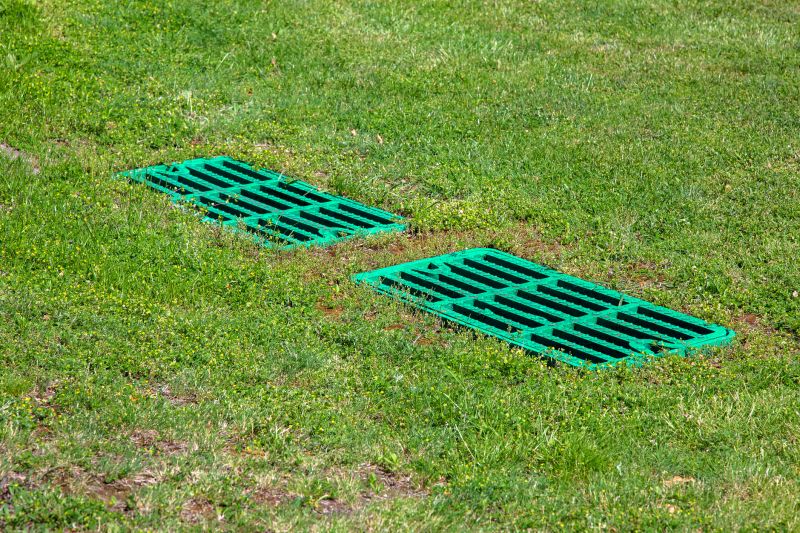Favorite Yard Drainage Accessories To Prevent Water Accumulation
Choose from a selection of essential drainage accessories that help maintain a dry and healthy yard environment.
 Effective yard drainage solutions are essential for managing excess water and preventing pooling or erosion. Proper drainage systems help protect landscaping, foundations, and outdoor structures from water damage. There are numerous products designed to channel, divert, or absorb water, each suited to different yard conditions and needs. Understanding the various options available can assist homeowners and landscapers in selecting the most appropriate solutions for their outdoor spaces.
Effective yard drainage solutions are essential for managing excess water and preventing pooling or erosion. Proper drainage systems help protect landscaping, foundations, and outdoor structures from water damage. There are numerous products designed to channel, divert, or absorb water, each suited to different yard conditions and needs. Understanding the various options available can assist homeowners and landscapers in selecting the most appropriate solutions for their outdoor spaces.
Top Overall Option
Flexible Drainage Pipe System
A versatile and adaptable drainage pipe system made from durable, corrugated materials. It is designed to efficiently channel water away from problem areas and can be easily customized to fit different yard layouts. Its flexibility allows for installation around trees, flower beds, and uneven terrain, making it a practical choice for various drainage needs.
Types of Products For Yard Drainages
Perforated Drainage Pipes
Corrugated or smooth pipes with perforations that allow water to enter and be transported away from the yard.
Drainage Gravel and Pebbles
Loose aggregates used to improve soil drainage and support underground piping systems.
French Drain Kits
Preassembled systems that include pipes, gravel, and fabric to create effective water diversion channels.
Drainage Sleeves and Filters
Protective covers that prevent debris from clogging drainage pipes, ensuring consistent water flow.
Surface Drain Grates
Grates installed on the surface to collect and direct runoff away from specific areas.
Subsurface Drainage Systems
Underground piping networks designed to manage large volumes of water below the surface.
Rain Gardens and Bioswales
Landscaped features that absorb and filter stormwater runoff naturally.
Drainage Matting and Geotextiles
Materials used to reinforce soil and improve drainage in landscaped areas.
Water Diverter Barriers
Physical barriers that redirect water flow away from problem zones.
Expandable Drainage Channels
Flexible channels that can be expanded or shaped to fit specific yard contours.
Drainage Baskets and Catch Basins
Containers that collect debris and facilitate water flow into underground pipes.
Flexible Corrugated Pipes
Lightweight, bendable pipes suitable for various installation scenarios.
Drainage Pumps
Mechanical devices that actively move water from low-lying areas to drainage outlets.
Rainwater Harvesting Systems
Collection systems that store stormwater for reuse and reduce runoff.
Drainage Soaker Hoses
Perforated hoses that slowly release water into the soil for absorption.
Popular Choices
Widely used underground piping that helps direct water away from critical areas.
Commonly installed to manage water pooling and improve yard drainage.
Popular for creating effective fill layers around pipes and in drainage beds.
Frequently used on surface to manage runoff and prevent erosion.
Standard components for collecting surface water and debris.
Increasingly favored for natural stormwater management.
Commonly selected to protect pipes from clogging.
Popular for redirecting water flow efficiently.
Chosen for their flexibility and ease of installation.
Often used in yards with heavy water accumulation.
Increasingly integrated into landscaping for natural water absorption.
Selected for yards with persistent water pooling issues.
Widely used to prevent soil and debris from clogging drainage systems.
Popular for reducing runoff and collecting water for reuse.
Commonly used in garden beds for slow water infiltration.
Drainage products vary widely in design, material, and installation requirements. Some systems focus on redirecting water away from problem areas, while others are intended to absorb water directly into the ground. The choice of product often depends on factors such as yard slope, soil type, volume of water, and the specific drainage issues faced. Installing the right system can improve yard usability, prevent flooding, and maintain the structural integrity of nearby buildings.
When selecting drainage products, considerations such as durability, ease of installation, maintenance needs, and compatibility with existing landscaping features are important. Proper planning and understanding of your yard's water flow patterns can lead to more effective drainage solutions. Consulting with professionals or conducting thorough research can help determine the most suitable products for your specific drainage challenges.
Investing in quality yard drainage products can enhance outdoor space functionality and longevity. Whether you are dealing with minor pooling or significant water flow issues, there are options available to suit various needs and budgets. By evaluating your yard's unique conditions and selecting appropriate products, you can create a more stable and enjoyable outdoor environment.
Key Buying Considerations
- Assess the volume of water flow and drainage needs in your yard.
- Determine the soil type and drainage capacity of your landscape.
- Consider the slope and natural water runoff patterns of your yard.
- Choose durable materials that withstand weather and soil conditions.
- Evaluate installation complexity and whether professional help is needed.
- Identify the space available for drainage systems and their layout.
- Think about maintenance requirements for long-term effectiveness.
- Match product size and capacity to the severity of drainage issues.
- Ensure compatibility with existing landscaping features.
- Opt for systems that allow flexibility for future yard modifications.
- Consider the environmental impact, even if eco-friendliness is not a focus.
- Check for clog prevention features like filters or sleeves.
- Estimate budget constraints and select options within your range.
- Review product warranties or guarantees for peace of mind.
- Look for user reviews or recommendations to gauge performance.
